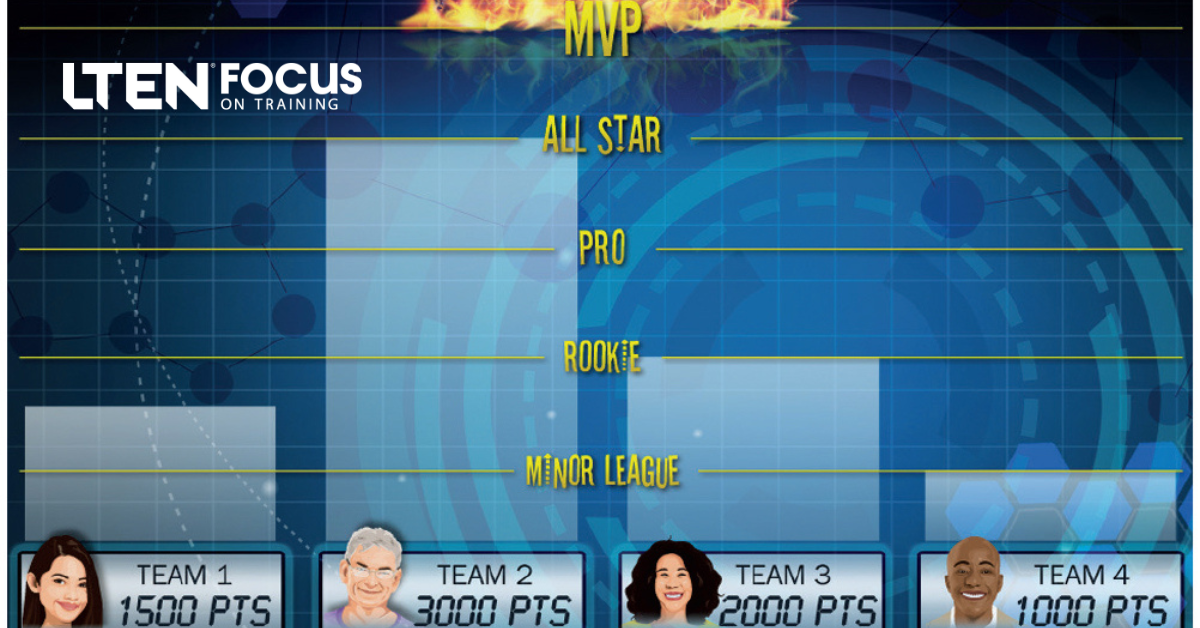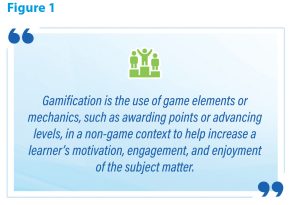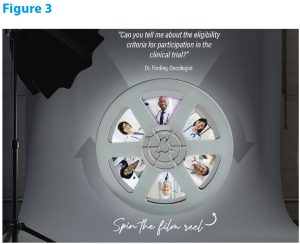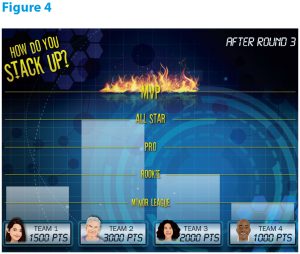
Here are some creative ways to incorporate game-based learning and gamification
Gamification – By Julie Swasey
 How often have you heard the following?
How often have you heard the following?
“This workshop needs to include activities to help representatives practice verbalizing calls with customers, but please don’t call them ‘role-play’ activities. The sales force hates that term!”
Verbalization activities are a vital part of sales workshops, and for a good reason. Reps communicate with customers daily, whether delivering engaging openers, asking insightful probing questions, sharing marketing resources and approved messaging or compliantly addressing concerns and questions. A sales representative may know their product inside and out, but none of that matters if they are unable to communicate the information to a customer effectively.
The challenge remains: How can we design workshops that help reps practice their sales call verbalizations without the dreaded “role play” or “turn to your partner” activities?
One way to add fun and engagement to verbalization workshops is to incorporate game-based learning or gamification. In game-based learning, participants learn a specific skill or reach a desired learning outcome by playing a game. (See Figure1.)
 Here are five creative ways to incorporate game-based learning and gamification into your verbalization workshops.
Here are five creative ways to incorporate game-based learning and gamification into your verbalization workshops.
1. Introduce Scenarios
One effective method of getting reps to practice verbalizing conversations with customers is to provide them with realistic scenarios of fictional healthcare providers. Traditionally, print scenarios would be distributed to participants, or the scenarios might be displayed on screen.
To gamify this activity, consider having different scenarios generated randomly. This helps add mystery and fun to the activity while keeping everyone on their toes since participants need to be prepared for anything.
In a live workshop setting, you might have reps spin a wheel or roll dice to select a scenario — the number spun/rolled corresponds to the numbered scenario that is assigned. You could also print QR codes on posters displayed throughout the room, or on lanyards that participants wear — scanning each code reveals a unique scenario on a participant’s smartphone or tablet. (See Figure 2.)
 In a virtual workshop setting, PowerPoint-based spinning wheels and other tools can be used to generate customer scenarios randomly. (See Figure 3.)
In a virtual workshop setting, PowerPoint-based spinning wheels and other tools can be used to generate customer scenarios randomly. (See Figure 3.)
2. Advance to More Complex Challenges
Many popular video games allow players to advance to more challenging levels as they complete specific tasks. Consider using this same concept in your verbalization workshops.
For instance, you might develop an e-game focused on verbalizing product messaging. The game could begin with short, straightforward verbalization challenges (e.g., “Can you share the dosing and administration for this product?”). The challenges would get more complex as the game progresses to higher levels. For example, in addition to sharing product messaging, participants might also have to address customer questions or concerns. In a live setting, participants could receive badges as they demonstrate their skills and advance to higher levels.
3. Award Points for Quality Verbalizations
 Think of the excitement a player feels when scoring the winning basket in a game or seeing the words “New High Score!” flash across the screen of their videogame. You can bring this excitement to your workshop by incorporating a points-based scoring system into verbalization activities.
Think of the excitement a player feels when scoring the winning basket in a game or seeing the words “New High Score!” flash across the screen of their videogame. You can bring this excitement to your workshop by incorporating a points-based scoring system into verbalization activities.
Facilitators can listen to rep verbalizations and award points based on their quality and effectiveness. To ensure consistency with how points are awarded, facilitators should be provided with a rubric outlining specific topics to listen for.
Points can be distributed manually and tracked on a scorecard or programmed into an app that keeps a running tally. The total scores for the workshop can be displayed on a leaderboard, with the individual or team with the highest number of points earning bragging rights or prizes. (See Figure 4.)
4. Introduce Competition
Being a sales representative is a competitive business, so why not add friendly competition to your verbalization workshops? One fun way to do this is through a mock trial activity.
Participants are placed into two legal teams. Each person on the team is assigned a specific role to play, such as the lawyers, who deliver opening and closing arguments, or expert witnesses, who must address questions and concerns. Then, the teams face off in court and present the case for why a provider should use their product. The facilitator acts as the provider, or judge, and delivers the final verdict on which legal team presented their case more effectively.
Another fun activity is a verbalization competition modeled on the NCAA March Madness basketball tournament. Small teams of participants go head-to-head to see which team can deliver a more effective short call.
Facilitators play the role of referees and decide on the winning teams (again, a rubric should be used to ensure consistency in scoring). Winning teams advance to the next rounds in their brackets until a champion is crowned.
5. Foster Collaboration
Most of us think of games as competitive — you compete against other players or teams and try to score the most points or be the first to reach the finish line. But games can also foster collaboration and teamwork.
In “cooperative games,” all players must work together to achieve a common goal, and each player contributes to the team’s overall success or failure. You can incorporate elements of cooperative games into your workshops by challenging teams of reps to work together on verbalization challenges.
For instance, teams might deliver a round-robin sales call at different customer stations, or they might take turns verbalizing answers to rapid-fire questions posed by a facilitator. Completing these challenges would allow teams to move toward a common goal – exiting from an escape room, learning clues that will help them solve a puzzle or collecting a certain number of cards or tokens to “win” the game.
Conclusion
There are endless possibilities for using game-based learning and gamification to make verbalization workshops more fun and engaging. No matter which methods you select, your workshop is bound to be a winner!
 Julie Swasey is manager, instructional design, for Custom Learning Designs (CLD). Email Julie at julie.swasey@cldinc.com.
Julie Swasey is manager, instructional design, for Custom Learning Designs (CLD). Email Julie at julie.swasey@cldinc.com.








